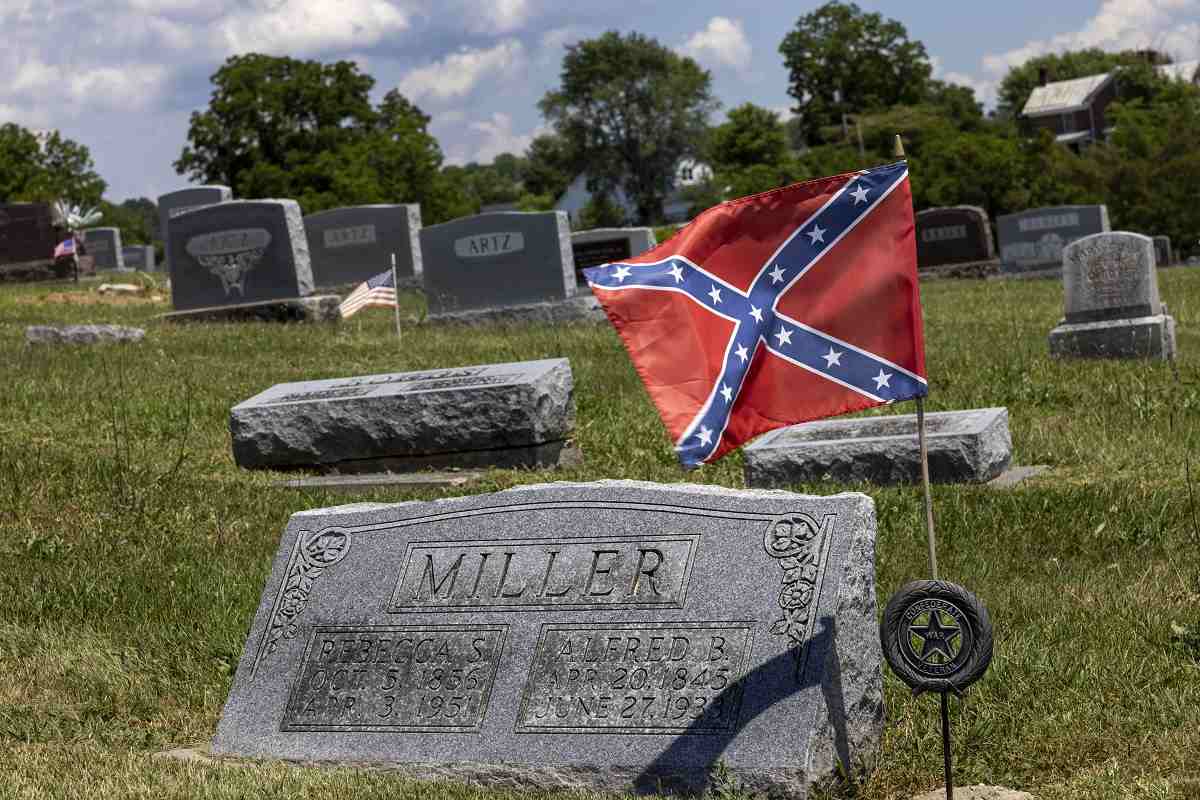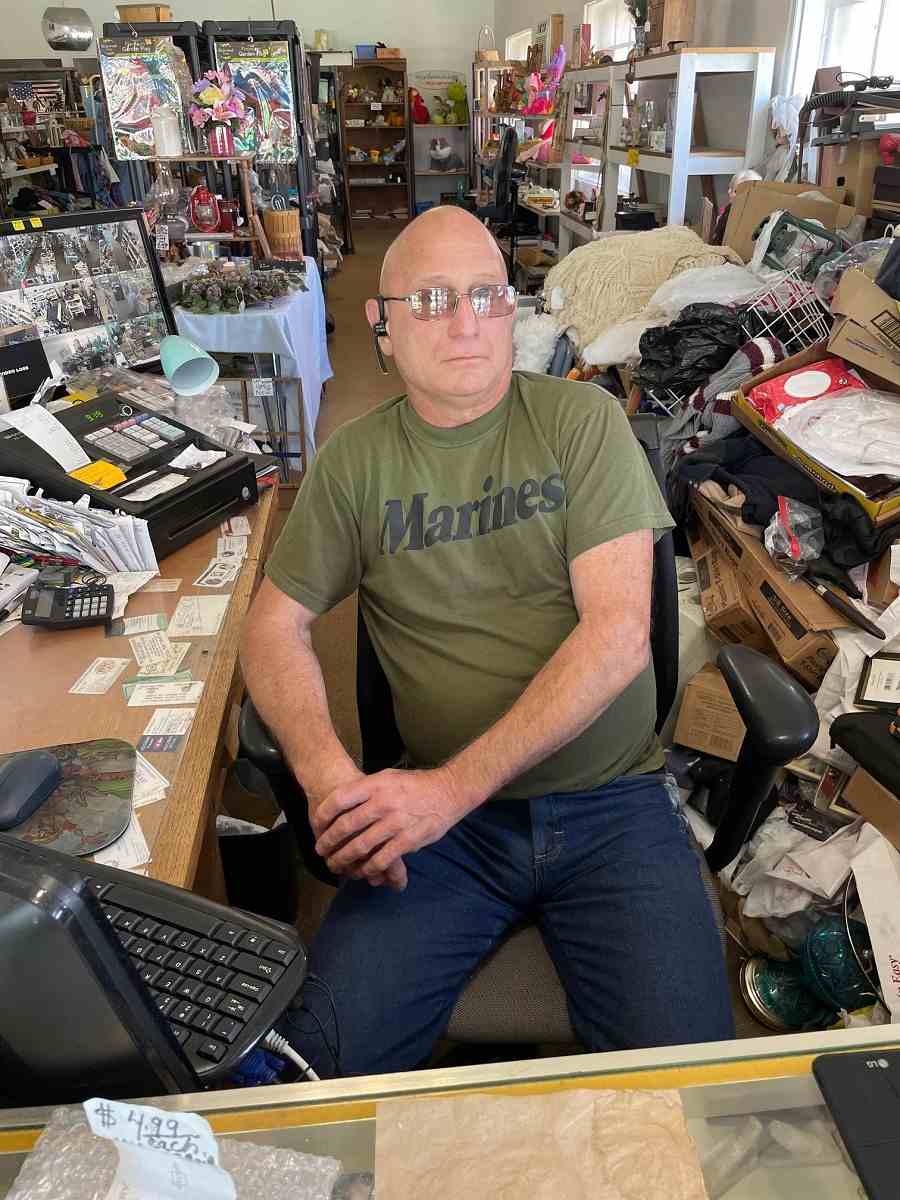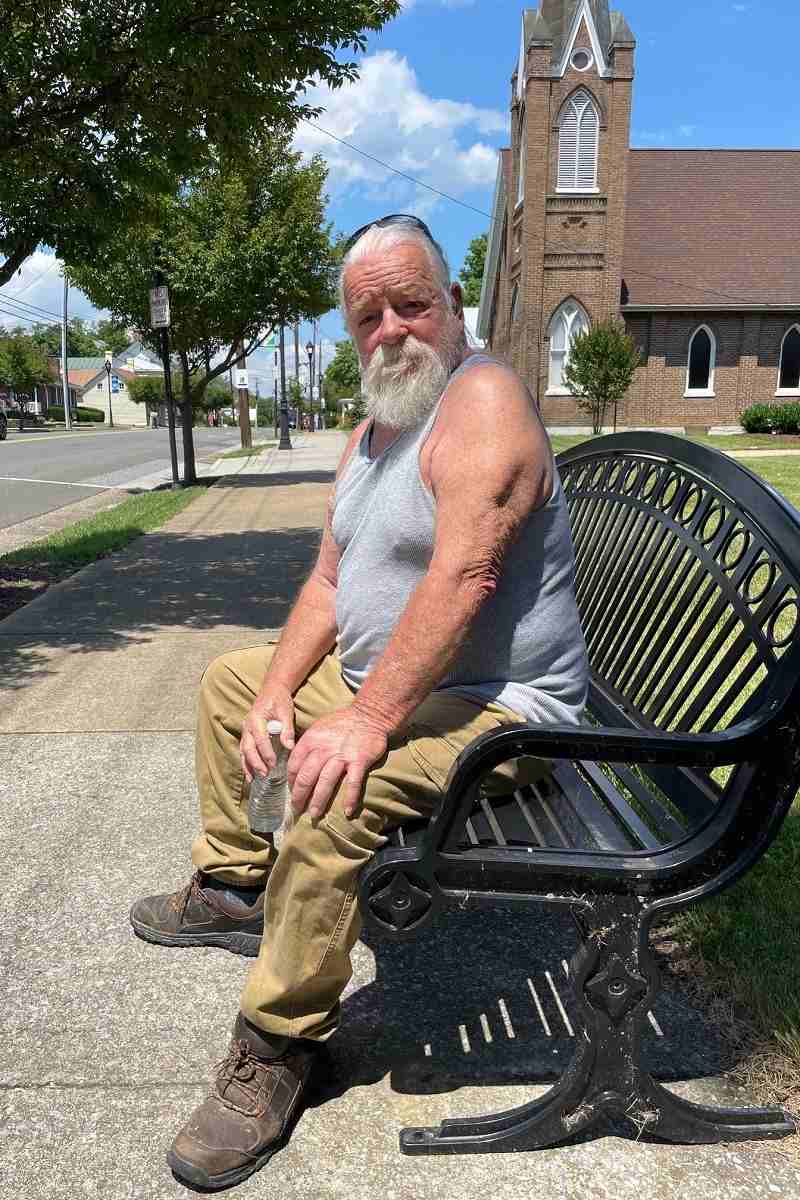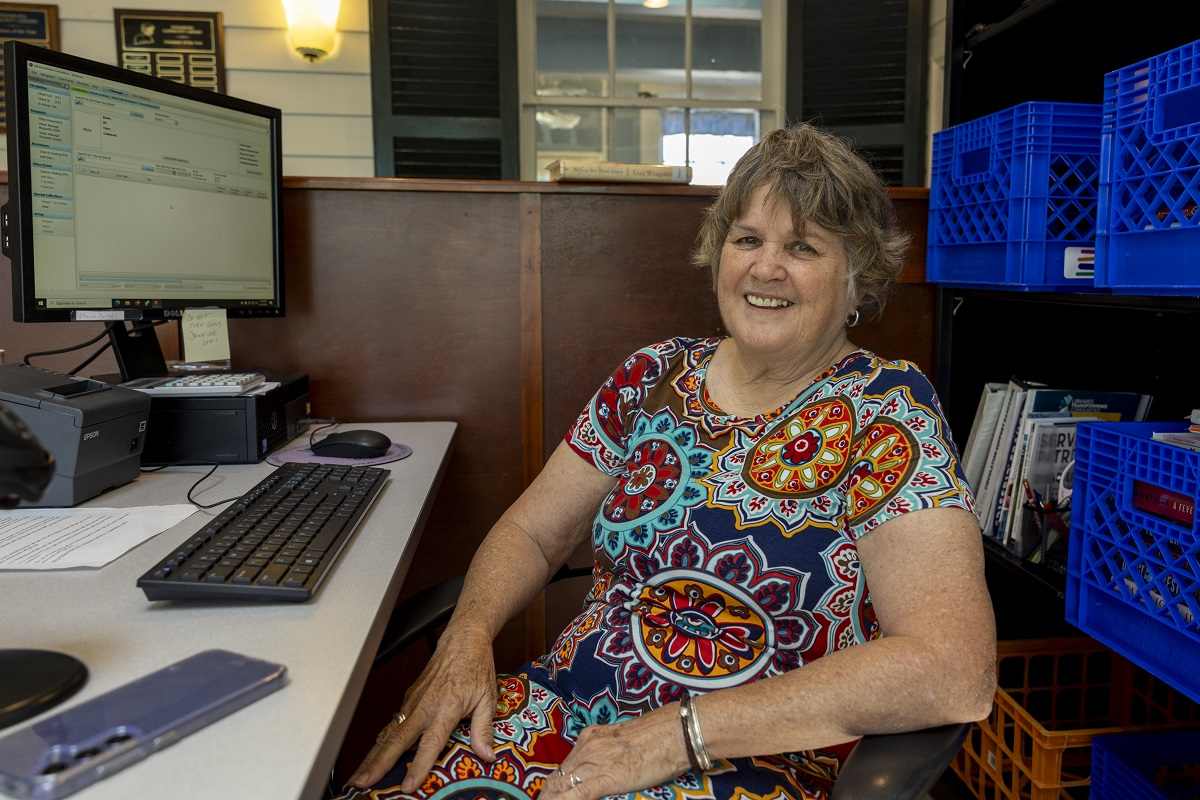
Stonewall Jackson High School, outside Mt. Jackson, Va.
13:18 JST, June 17, 2024
WOODSTOCK, Va. – A.D. Carter V worries about the pressure he’ll feel next year when he walks through the doors of the newly renamed Stonewall Jackson High School – a Black student forced to pay homage, every day, to a Confederate icon of the Lost Cause.
“It’s not going to be the happiest place,” he said. “I’m walking in there knowing that this name signifies that I wasn’t originally intended to go there nor allowed to go there.”
Carter is one of five high-schoolers who joined a lawsuit filed recently by the Virginia NAACP against the Shenandoah County School Board over its decision last month to restore the names of Confederate leaders at two schools after they were removed in 2020.
Resurrecting the names has inflamed tensions in a county with deep ties to battles of the Civil War, where towns are dotted with signs tracing troop movements and cannons are as common as gas stations. When other Virginia communities took down Confederate memorials over the past few years, Shenandoah County’s battlefields gave some of them a new home. In one high-profile case, Virginia Gov. Glenn Youngkin (R) designated the county’s New Market Battlefield to receive the Confederate monument removed last year from Arlington National Cemetery.

Confederate flags at headstones in the Riverview Cemetery in Strasburg, Va.
Many in the county – particularly in the southern end, where the two schools are located – believe it was a mistake to purge the Confederate names in the first place.

Jim Arnold, 63, a Marine Corps veteran
“The names are just names. History is history,” said Jim Arnold, 63, a shopkeeper in the town of Mt. Jackson, who believes the Civil War was an ugly chapter but is part of the fabric of the place. “Was it good? No. Should it have happened? No. But it happened. You can’t change history by changing the name. … Slavery wasn’t because of Stonewall Jackson.”
On Thursday night, at the first school board meeting since last month’s vote, member Gloria Carlineo said she and her colleagues are “fully committed to fighting this lawsuit to the extent of the law.”
Carter, his schoolmate and fellow plaintiff Briana Brown, and their families sat watching in silence.
The controversy has drawn international attention to this bucolic valley tucked between mountain ranges an hour and a half west of Washington, where about 86 percent of the 44,000 residents are White, according to the 2020 Census. It is believed to be the first instance nationwide of a school board restoring Confederate names that were removed during the widespread racial reckoning following the murder of George Floyd by Minneapolis police in 2020.
“We have received a lot of positive feedback on this. However, not all has been positive,” Carlineo said at Thursday’s meeting. Board members and staff have gotten “a lot of nasty, vulgar accusations, harassment, email, phones, text and all that.”
“Vulgar phone calls … by the hundreds,” board member Michael D. Rickard said after the meeting. “We’ve gotten phone calls from as far away as Oregon, Washington, California. Of course, they’re only getting a snippet of what actually transpired over the whole thing. They don’t understand the big picture.”
***
A backlash began almost instantly four years ago when the school board voted during a virtual meeting to retire the Confederate names. The board later decided to change the high school from Stonewall Jackson to Mountain View and a nearby elementary school from Ashby Lee – named for both Gen. Robert E. Lee and cavalry commander Turner Ashby Jr. – to Honey Run.
Cynthia Walsh, a former school board member who supported the change, said she was harassed with phone calls and dirty looks at the grocery store. Alumni packed school board meetings to condemn the decision.
Walsh said the board decided to act after other community members expressed their discomfort with the names, and that summer’s marches and protests around the country drove a sense of urgency. Stonewall Jackson High School, in particular, had been built in 1959 during the era of Massive Resistance to integration, and some viewed the name as intended more to intimidate than commemorate.
In 2021, a countermovement spread around the state: Republicans demanded the banning of “critical race theory” in schools and Youngkin ran for office on a message of “parents’ rights.” Three new Shenandoah County School Board members rode those themes to victory. The board revisited the name change in 2022 but deadlocked, 3-3, on whether to act.
Walsh said she understands that some were frustrated by how quickly the board moved in 2020, but she was hoping the new board would simply criticize the actions and move on. “But they decided to just go all the way,” she said.
A local group called the Coalition for Better Schools supported three more board members who won election last fall with the goal of overturning the name change. The effort came to fruition last month, passing in a 5-1 vote. The lone member who voted against – Kyle Gutshall – said in an interview that he cast the vote based on feedback from people in his district in the town of Woodstock, which he added was more liberal than his own personal views.
“We’re happy the school board listened to the constituents and that they took it seriously and moved forward with the vote,” Mike Scheibe, spokesman for the coalition, said Friday. “Now we are waiting to see what’s going to happen with the litigation and the lawsuit.”
Officials had stored the old Confederate signage on school grounds, county superintendent Melody Sheppard said last week, and moved quickly to get it reinstalled earlier this month. The work was paid for by an undisclosed amount of private donations from the coalition. Scheibe said the group has received contributions from around the country to fund the remaining changes, like new team jerseys and school stationery. He said it amounts to “six figures.”
As if to mount a final assault against the original name change, school board member Brandi Rutz called Thursday for a forensic audit of the work done in 2020. “There’s a lot of shadows around that,” she said, suggesting that the previous school board tapped into special education funds. “I’d like to see where that money came from.”

A.D. Carter and Briana Brown, both 17, students at the newly renamed Stonewall Jackson High School, joined the lawsuit the Virginia chapter of the NAACP filed against the Shenandoah County School Board over the renamings.
For students Carter and Brown, both 17 and rising seniors, the controversy has sapped some of the joy out of summertime – going to the pool, kayaking, making a run to Sheetz for snacks. They both love theater, and recently the two played Rusty and Willard in a stage production of “Footloose.”
“We really do love this area, and there’s so many great people and so many great teachers,” Brown said. “It just ruins all that by making people think that this isn’t a community that is united.”
The complaint details the history of the school names and student experiences, alleging that the new names deny Black students equal access to educational opportunities. It also argues that the name change infringes on a student’s freedom of expression by forcing them to represent a message they might not support – like donning the name Stonewall on a jersey.
Both said they wanted to join the lawsuit so future students won’t have to feel the same pressures they do, and worry that it’s only a matter of time before another school sees what happened in Shenandoah and follows suit. If people could understand what it feels like to be a Black student confronting these names, they said, it might change some opinions and make people less divided.

Roger Caplinger, 77, a retired brick mason in New Market, Va.
But for many steeped in the county’s history, turning away from Confederate heritage is a tall order. “Stonewall Jackson is a good name. It’s history. It should not be changed, it should be remembered,” said Roger Caplinger, 77, a retired brick mason sitting on a park bench one recent morning in New Market.
The road before his bench, Route 11, was known as the Valley Pike and saw thousands of Southern and Northern troops marching through during the war. Cadets from the Virginia Military Institute fought and died here. The local summer league baseball team is the Rebels. “I had ancestors fighting on both sides,” Caplinger said. “I go more Confederate in my heart, though.”
“These people need to get over this – Blacks and Whites and whatever. You know?” said Guy Good, 61, manning the front desk at his son’s vintage auto parts shop a few blocks to the south. Stonewall Jackson “is a person’s name. I don’t think it’s got anything to do with all this history stuff,” he said. Nonetheless, it should never have been removed. “What happened back then, we can’t help,” he said. “They keep on wanting to drag this out. … People need to grow up.”

Mary Redmon, a retired teacher who now volunteers at the Strasburg Community Library.
Not everyone agrees. At the northern end of the county, Mary Redmon, 74, sat at the front desk of the Strasburg Community Library. A Shenandoah native, Redmon said she had three great-grandfathers who fought for the Confederacy in the Civil War. While she respects them as men, she said she understands they supported the wrong cause.
Redmon recalled growing up in the area when people hung photos of Robert E. Lee on their walls and schools taught that slavery wasn’t all bad. It was a pride in the Confederacy that she said she had to unlearn to move forward.
“It was deep in the DNA of this valley,” Redmon said.
She was thrilled to see the students had filed a lawsuit against the school district. She views it as a common-sense issue – if students feel uncomfortable, the names should not be added back. “If somebody is insulted and hurt by something, you don’t do it,” she said. “It’s almost a matter of politeness.”
After Thursday night’s school board meeting, a reporter asked board member Rickard if he felt concern about the students who were troubled or hurt by restoring the Confederate names. He paused for several seconds. “I’m trying to think of an artful way of responding to that,” he said, then paused several more seconds.
“With it being under litigation,” he finally said, “I wouldn’t want to comment right now.”
Top Articles in News Services
-

Survey Shows False Election Info Perceived as True
-

Hong Kong Ex-Publisher Jimmy Lai’s Sentence Raises International Outcry as China Defends It
-

Japan’s Nikkei Stock Average Touches 58,000 as Yen, Jgbs Rally on Election Fallout (UPDATE 1)
-

Japan’s Nikkei Stock Average Falls as US-Iran Tensions Unsettle Investors (UPDATE 1)
-

Trump Names Former Federal Reserve Governor Warsh as the Next Fed Chair, Replacing Powell
JN ACCESS RANKING
-

Producer Behind Pop Group XG Arrested for Cocaine Possession
-

Japan PM Takaichi’s Cabinet Resigns en Masse
-

Man Infected with Measles Reportedly Dined at Restaurant in Tokyo Station
-

Israeli Ambassador to Japan Speaks about Japan’s Role in the Reconstruction of Gaza
-

Videos Plagiarized, Reposted with False Subtitles Claiming ‘Ryukyu Belongs to China’; Anti-China False Information Also Posted in Japan
























